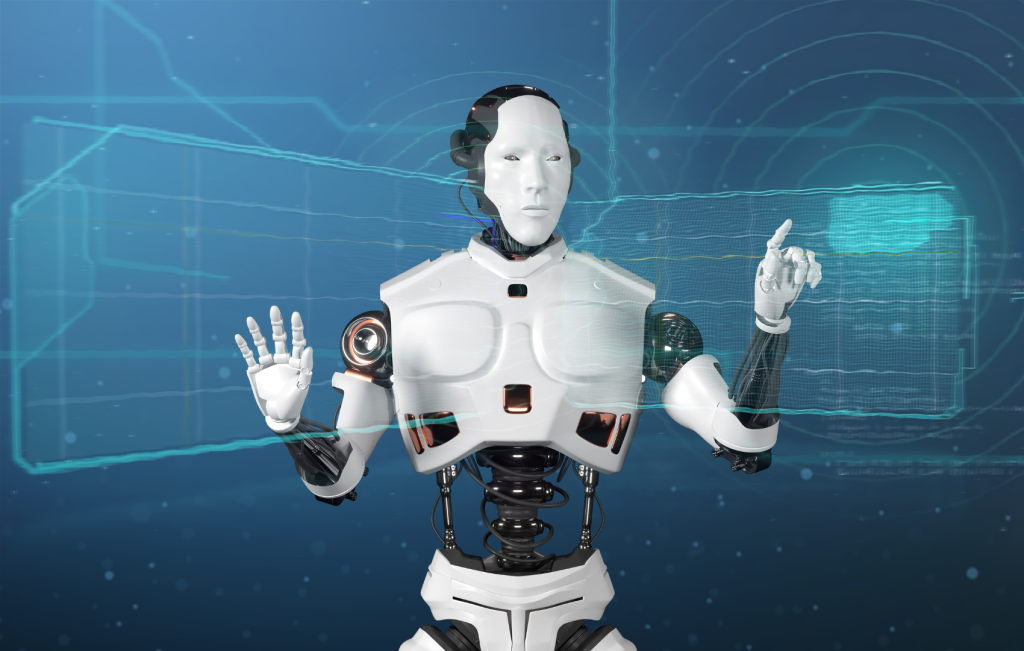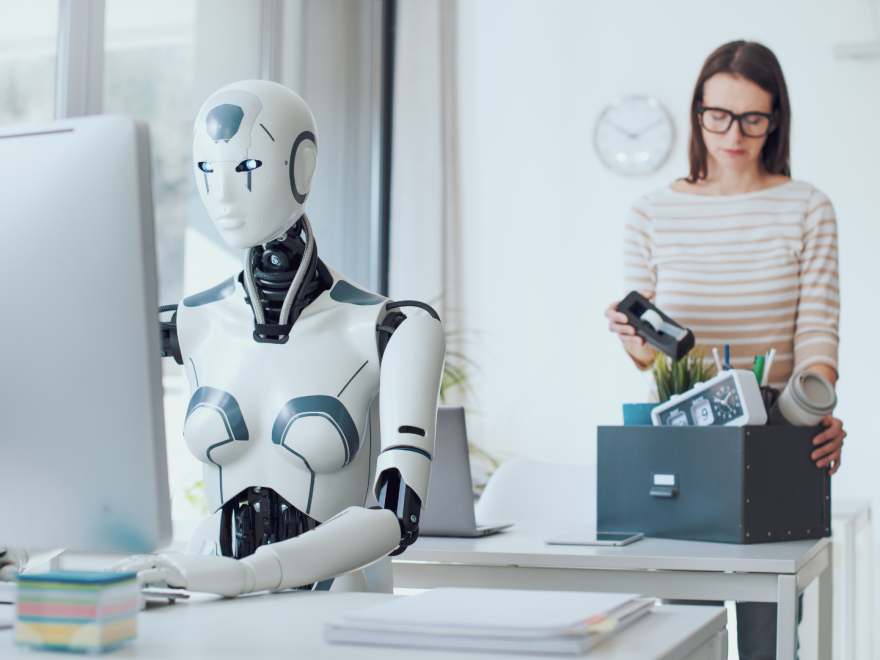Table of Contents
Introduction
Future with Ai prediction – Artificial Intelligence (AI) is rapidly transforming industries, automating tasks, and redefining the future of work. Over the next decade, AI is expected to replace certain jobs while creating new opportunities in tech-driven fields. This article explores AI’s impact on employment, the industries most affected, and how workers can adapt to the changing landscape.
Related article: How to use AI to make money – a comprehensive guide and Top AI companies to watch.
The Evolution of AI Over the Next Decade
AI is advancing at an exponential rate, with developments in machine learning, natural language processing (NLP), robotics, and automation. Key AI trends expected to shape the next 10 years include:
- AI-Driven Automation – More businesses will implement AI to enhance efficiency and reduce costs.
- Advancements in Robotics – AI-powered robots will take over repetitive, manual, and hazardous tasks.
- AI in Creative Fields – AI-generated content, music, and art will become more sophisticated.
- AI Regulation and Ethics – Governments will introduce policies to address AI-related job displacement and ethical concerns.
Future with AI Prediction – Jobs AI Will Likely Replace by 2035

While AI will improve productivity, it will also lead to job automation in specific industries. Below are some professions most at risk:
1. Customer Service Representatives
- Why? AI chatbots and virtual assistants can handle customer inquiries 24/7 with minimal human intervention.
- Examples: AI-driven customer support platforms like ChatGPT, Google Bard, and IBM Watson.
- Impact: Call centers and customer service jobs will see significant declines.
2. Retail Cashiers
- Why? Self-checkout kiosks and AI-powered stores (like Amazon Go) eliminate the need for human cashiers.
- Impact: Retail stores will rely more on automated checkout systems, reducing cashier positions.
3. Data Entry Clerks
- Why? AI-powered optical character recognition (OCR) and machine learning algorithms can accurately process and analyze data.
- Impact: Many clerical jobs in finance, administration, and logistics will become obsolete.
4. Manufacturing and Factory Workers
- Why? AI-driven robots enhance precision, efficiency, and speed in assembly lines.
- Examples: Tesla’s Gigafactories and AI-powered automation in supply chain management.
- Impact: Traditional assembly-line jobs will decline, but AI maintenance roles will grow.
5. Transportation and Delivery Drivers
- Why? Self-driving technology is improving rapidly, making autonomous vehicles viable for transportation and delivery services.
- Examples: Tesla’s Full Self-Driving (FSD), Waymo, and autonomous delivery robots.
- Impact: Rideshare drivers and truck drivers may face reduced employment opportunities.
6. Bank Tellers and Financial Analysts
- Why? AI-powered financial software can automate banking transactions and investment analysis.
- Examples: Robo-advisors like Betterment and AI-driven fraud detection systems.
- Impact: Many routine banking jobs will decline, though AI oversight roles may emerge.
7. Warehouse and Inventory Managers
- Why? AI-driven robots can efficiently manage warehouse logistics, picking, and packing.
- Examples: Amazon’s AI-powered warehouse robots.
- Impact: Fewer human workers will be needed for warehouse management tasks.
8. Telemarketers
- Why? AI-powered voice assistants and automated marketing tools can handle cold calls more effectively.
- Impact: Human-driven telemarketing roles will decrease as AI-driven sales solutions improve.
9. Paralegals and Legal Assistants
- Why? AI can review legal documents, draft contracts, and conduct legal research with high accuracy.
- Examples: AI legal tools like ROSS Intelligence and DoNotPay.
- Impact: Routine legal tasks will be automated, though lawyers will still be needed for complex cases.
10. Medical Transcriptionists and Radiologists
- Why? AI-driven software can transcribe medical reports and analyze medical images with high accuracy.
- Examples: AI radiology systems detecting tumors more efficiently than human radiologists.
- Impact: AI will assist doctors, reducing demand for transcriptionists and radiologists.
Future with AI Prediction – Jobs AI is Unlikely to Replace
While AI will replace some jobs, many professions will remain safe due to their reliance on human creativity, emotional intelligence, and complex problem-solving.
1. Healthcare Professionals (Doctors, Nurses, Surgeons)
- AI can assist in diagnosis but cannot replace human empathy and decision-making in patient care.
2. Educators and Teachers
- AI-powered learning tools can enhance education, but human teachers provide personalized learning and emotional support.
3. Creative Professionals (Writers, Designers, Filmmakers)
- AI-generated content is improving, but human creativity and storytelling remain irreplaceable.
4. Engineers and AI Developers
- AI needs skilled professionals to develop, maintain, and improve AI systems.
5. Social Workers and Therapists
- AI cannot replace the emotional and psychological support provided by human professionals.
6. Skilled Trades (Electricians, Plumbers, Carpenters)
- AI and robotics struggle with complex, hands-on tasks requiring adaptability.
7. Entrepreneurs and Business Leaders
- Strategic decision-making, leadership, and innovation remain human strengths.
How to Prepare for AI’s Impact on Jobs
AI-driven job automation doesn’t mean the end of employment opportunities. Workers and students can adapt by:
1. Learning AI and Automation Skills
- Gain knowledge in AI programming, machine learning, and data science.
- Enroll in AI-related courses from platforms like Coursera, Udacity, and edX.
2. Developing Soft Skills
- Strengthen communication, problem-solving, and emotional intelligence.
- Jobs requiring human interaction and creativity will remain in demand.
3. Exploring AI-Resistant Careers
- Shift towards professions that require complex decision-making and personal interactions.
4. Staying Updated with Industry Trends
- Follow AI advancements and how they affect your industry.
- Adapt your career strategy based on AI’s evolving role.
5. Embracing Lifelong Learning
- Continuous education and upskilling are crucial in an AI-driven world.
Conclusion
AI will undoubtedly reshape the workforce over the next decade, automating repetitive tasks while creating new opportunities in technology-driven fields. While some jobs will be replaced, those who adapt, reskill, and embrace AI technology will find new and promising career paths.
The future of work is not about AI replacing humans, but rather humans and AI working together to achieve greater efficiency and innovation. The key to success in an AI-powered world is adaptability, continuous learning, and leveraging technology to enhance rather than replace human potential.

